SHADOW OF THE TREE
Eric Hounshell, Ruth Amstutz (Hg.)
Diagrams have long been used to describe, claim, and produce the relatedness of human individuals and groups, animals, and plants. The tree form seems to have attained particular dominance, both within specific domains of practice and in historical scholarship. This pertains, moreover, to representations of non-organismic entities that draw from and flow back into the broad cultural history of the tree. And yet a wide variety of diagrams have been devised, sometimes in connection with the tree, other times as an explicit alternative, or as a novel or idiosyncratic invention. This volume, which brings together a commensurately diverse mix of historians of the natural and human sciences, social historians, philosophers, and historians of art and media, wishes to bring the variety of diagrammatic forms out from under the “shadow of the tree” – while also taking seriously the ubiquity of the tree and its implications.
- Germany, 2024, 168p.,
ISBN: 978-3-907380-04-8
ISSN (online): 2673-5016
|
|
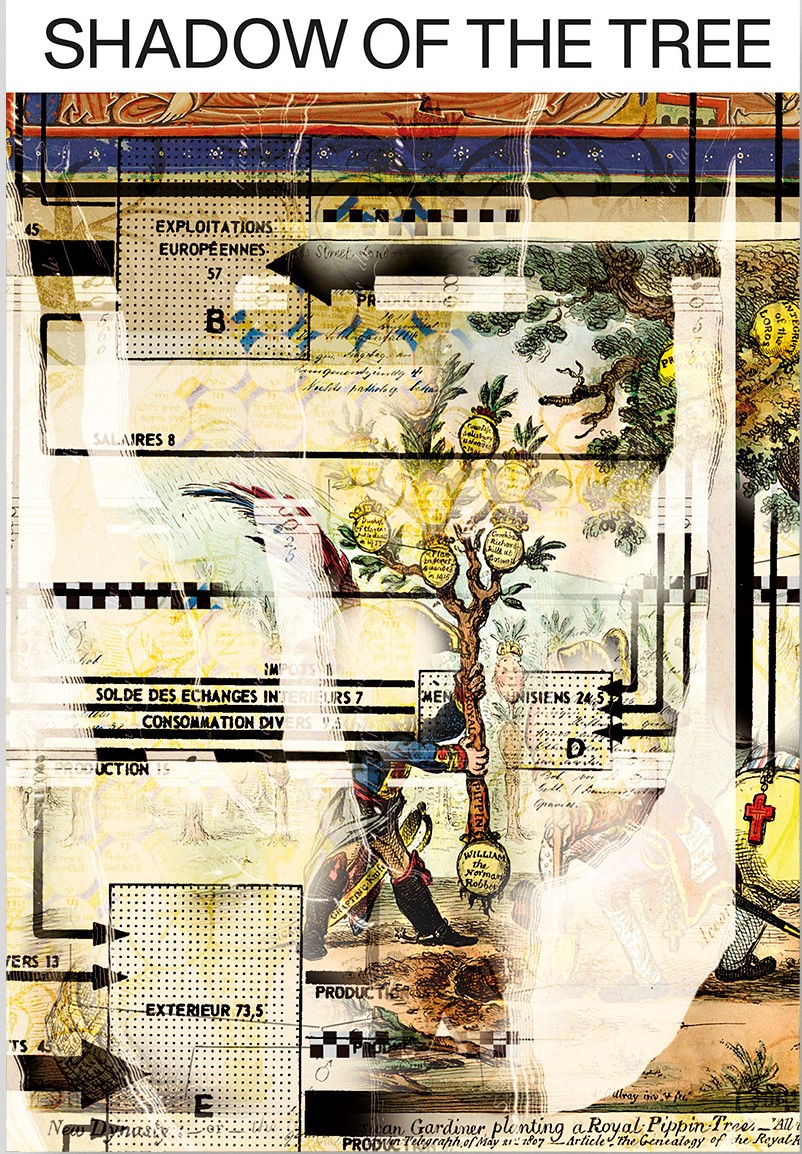
|
THE POLITICS OF MAKING KINSHIP
Historical and Anthropological Perspectives
Erdmute Alber, David Warren Sabean, Simon Teuscher und Tatjana Thelen (Hg.)
Although long excised from theories of the state, public sphere, and democratic order, kinship never completely disappeared from the political cultures of the West. The Politics of Making Kinship explores how political processes shaped various concepts of kinship, and highlights how specific understandings, idioms and uses of kinship have impacted political projects in return. From the post-Roman era to early modernity, and from colonial imperialism to the fall of the Berlin wall and beyond, kinship takes centerstage, as these international scholars skillfully reintegrate it with political theory.
- New York, 2023, 448 p.,
ISBN 978-1-80073-800-3
eISBN 978-1-80073-785-3 eBook
|
|
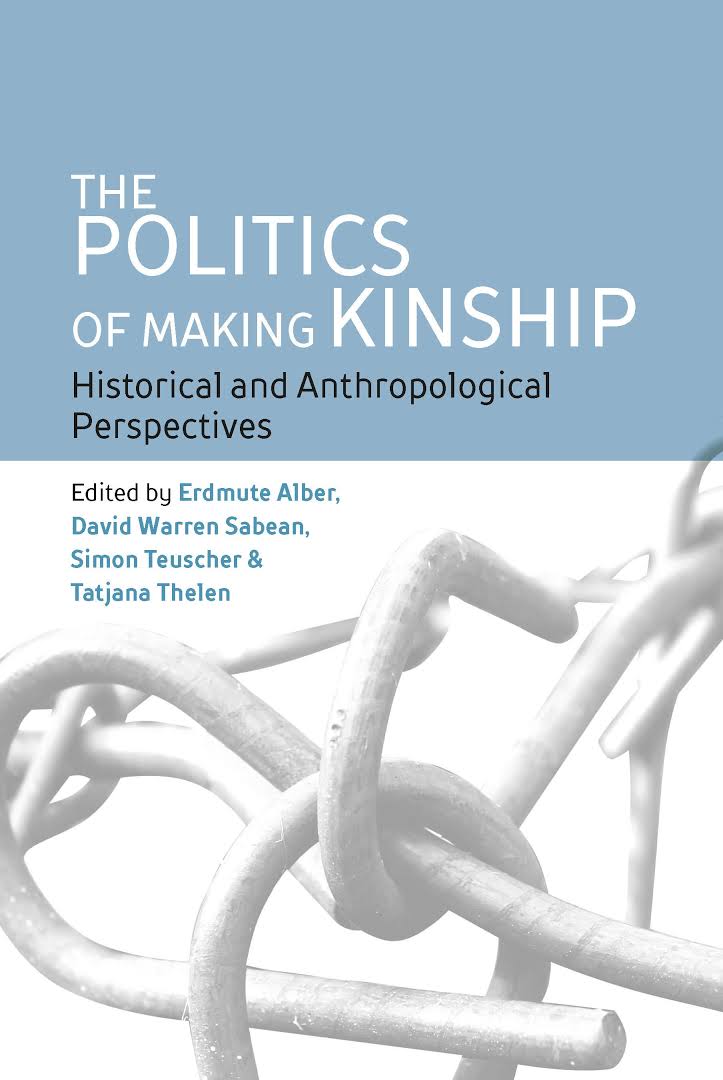
|
BLOOD AND KINSHIP
Matter for Metaphor from Ancient Rome to the Present
Christopher H. Johnson, Bernhard Jussen, David Warren Sabean, and Simon Teuscher (Hg.)
Blood awakens associations with ancient ideas. But we know very little about the historical representations of blood in Western cultures. The contributors attempt to follow the use of blood in mapping family and kinship relations in European culture from the ancient world to the present. The project is “reflexive” in that it takes as its point of departure the questions that anthropologists are now asking about how different societies think about the substances that connect people, that are understood to produce either “kinship”—where that is still considered to be a relevant category—or “relatedness.” What has been the development of European understandings of how kinship and blood are connected? “Blood” has come and gone in European culture, just as kinship has constantly been reconfigured. Both have been moving, sometimes in parallel and sometimes in divergent directions. And both have taken on quite different meanings over time.
- New York, Oxford 2015 (paperback), 368 p., 6 illus., 1 table
ISBN 978-1782381778
|
|
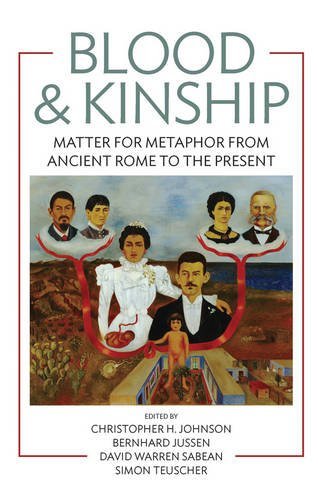
|
Habsburger Herrschaft vor Ort - weltweit: (1300-1600)
Beiträge der internationalen wissenschaftlichen Tagung auf Schloß Lenzburg bei Zürich, 9.-11. Oktober 2008. Herausgegeben von Jeannette Rauschert, Simon Teuscher und Thomas Zotz
Der Band befasst sich aus transnationaler Perspektive mit der lokalen Herrschaftsausübung der Habsburger. Der Blick richtet sich gezielt auf Peripherien des habsburgischen Herrschaftskomplexes, auf ländliche und kleinstädtische Verhältnisse, und auf die dort agierenden Amtleute – dies jedoch in ganz unterschiedlichen Weltgegenden: Die insgesamt 14 Beiträge untersuchen Beispiele aus Österreich, Süddeutschland und der Schweiz, den Niederlanden, der Iberischen Halbinsel sowie aus Mittel- und Südamerika. Die Beiträge fragen aus vergleichender Perspektive, was am habsburgischen Herrschaftskomplex eigentlich spezifisch habsburgisch war, und diskutieren das Verhältnis zwischen Zentralen und Außenstellen eines vormodernen politischen Systems.
- Ostfildern 2013, 300 Seiten mit etwa 16 z.T. farbigen Abbildungen Hardcover mit Schutzumschlag.
ISBN 978-3-7995-0891-9
|
|
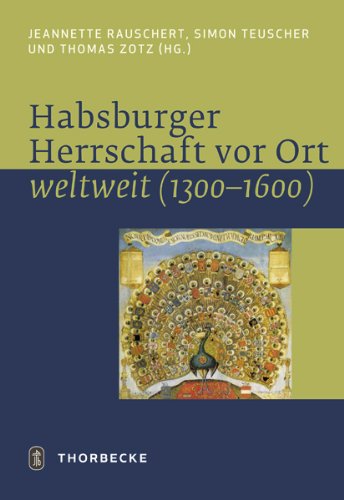
|
Lords' Rights and Peasant Stories
Writing and the Formation of Tradition in the Later Middle Ages
Simon Teuscher. Philip Grace (Übersetzung)
"Erzähltes Recht" von Simon Teuscher auf Englisch übersetzt.
In the mid-nineteenth century, Jacob Grimm published a collection of late medieval records of local law—called Weistümer—that was scarcely less comprehensive than his famous collection of fairy tales. As with the fairy tales, Grimm assumed that before their transcription, people had handed these down orally from time immemorial. His interest in these customary laws arose from their seemingly folkloristic notions of custom and from their poetic narratives about ritualized encounters between lords and peasants, capturing an oral tradition from an unsophisticated time.
Grimm's readings are still used today as a basis for theories about oral societies in the premodern West and contemporary non-Western societies and the modernizing effects of writing. As Simon Teuscher contends, however, those aspects of legal texts that have been considered since Grimm to be vestiges of a traditional preliterate popular culture were eventually rooted in relatively advanced and learned techniques of writing, jurisprudence, and administration. Lords' Rights and Peasant Stories uses examples from German- and French-speaking Switzerland to investigate what legal order meant to individuals and to a society at the eve of the early modern period. Teuscher deals with legal documents not only as texts, but also as objects. The book takes the materiality of documents seriously and reconstructs cultural techniques of their production and social practices of their use.
Lords' Rights and Peasant Stories suggests the need to rethink master narratives about transitions from oral to literate societies. It explores the local dimensions of processes of state-formation and the emergence of modern notions of law in western Europe. Students of rural society and village organization will find here a discussion of local power distribution that is inspired by social anthropology, that looks beyond simple antagonisms between lords and peasants, and that insists on the role of state servants and the unconscious effects of their writing practices.
- Philadelphia 2012, 320 p., 5 illus.
ISBN 978-0-8122-4368-0
|
|
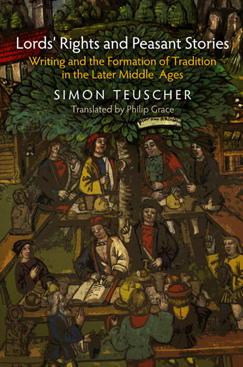
|
Königsfelden
Königsmord, Kloster, Klinik
Herausgegeben von Simon Teuscher und Claudia Moddelmog
Das Buch beleuchtet die Geschichte des «Campus regis», dem Ort wo 1308 König Albrecht von seinem Neffen ermordet wurde.
Das Kloster Königsfelden bei Brugg ist im Jahr 1311 am Ort der Ermordung von König Albrecht I. gestiftet worden. Als Grabstätte der Familie Habsburg-Österreich erlangte es unter der Förderung von Albrechts Witwe Elisabeth, seiner Tochter Agnes von Ungarn und seinen Söhnen rasch eine herausragende Bedeutung. Zeugen davon sind bis heute die international bedeutenden Glasmalereien, welche das Tor zum Paradies sinnbildlich verdeutlichen. Königsfelden hat eine wechselvolle Geschichte. Nach der Glanzzeit im 14. Jahrhundert folgten schwierige Jahre bis zur Reformation. Die Aufhebung als Kloster unter der Stadt Bern als neuer Herrin, die Umwandlung in einen Landvogteisitz und schliesslich im 19. Jahrhundert die Einrichtung einer psychiatrischen Klinik sind Stationen dieses einmaligen Bauwerks. Das Buch mit Beiträgen aus der aktuellen Forschung bietet einen reich illustrierten Überblick der Geschichte des Klosters von den Anfängen bis heute.
- Baden 2012, 288 Seiten, 133 Abbildungen, Format 20 x 27,5 cm, Pappband
|
|
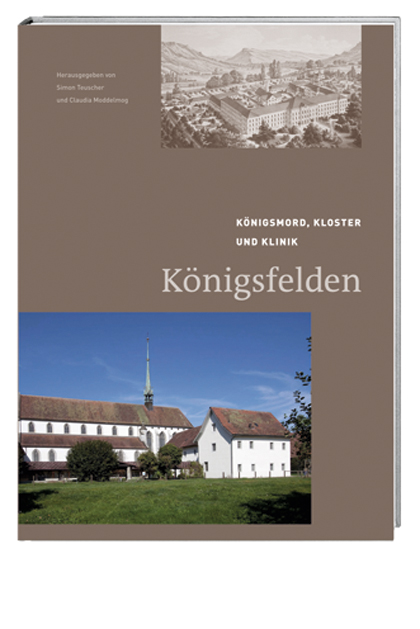
|
Transregional and Transnational Families in Europe and Beyond
Experiences Since the Middle Ages
Edited by Christopher H. Johnson, David Warren Sabean, Simon Teuscher and Francesca Trivellato
While the current discussion of ethnic, trade, and commercial diasporas, global networks, and transnational communities constantly makes reference to the importance of families and kinship groups for understanding the dynamics of dispersion, few studies examine the nature of these families in any detail. This book, centered largely on the European experience of families scattered geographically, challenges the dominant narratives of modernization by offering a long-term perspective from the Middle Ages to the twenty-first century. Paradoxically, “transnational families” are to be found long before the nation-state was in place.
- New York, Oxford 2011, 372 pages, 10 ills.,
ISBN 978-0-85745-183-5
|
|
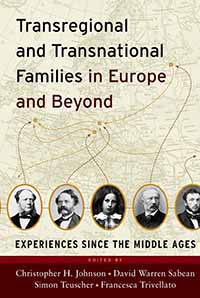
|